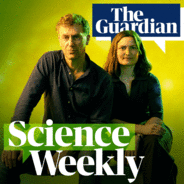Biodiversity correspondent Phoebe Weston takes Madeleine Finlay through the news from the UN Cop16 biodiversity summit in Cali, Colombia. Countries are wrangling over funding to protect nature and who should profit from the natural resources of the world’s least developed nations. Help support our independent journalism at theguardian.com/sciencepod

Wissenschaft & Technik
Science Weekly Folgen
Twice a week, the Guardian brings you the latest science and environment news
Folgen von Science Weekly
300 Folgen
-
Folge vom 31.10.2024Love motels and gridlocked talks: all the news from Cop16
-
Folge vom 29.10.2024The US tech startup promising smarter babiesA startup company, Heliospect Genomics, is offering to help wealthy couples screen their embryos for IQ using controversial technology that raises questions about the ethics of genetic enhancement. Science correspondent Hannah Devlin tells Madeleine Finlay about the joint investigation into the company by the Guardian and the campaign group Hope Not Hate. Help support our independent journalism at theguardian.com/sciencepod
-
Folge vom 24.10.2024What’s at stake for the climate if Trump wins?With less than two weeks until the US election, Madeleine Finlay speaks to climate activist and author Bill McKibben to find out what a win for Donald Trump could mean for the environment and the world’s climate goals. Help support our independent journalism at theguardian.com/sciencepod
-
Folge vom 22.10.2024How the asteroid that killed the dinosaurs made ants into farmersMadeleine Finlay hears from Ted Schultz, curator of ants at the Smithsonian National Museum of Natural History, about his recent study into the origins of fungi farming in ants. He tells Madeleine about the incredibly complex way that ants cultivate and protect their fungi gardens, and how the asteroid that hit Earth 66 million years ago could have kickstarted it all. Help support our independent journalism at theguardian.com/sciencepod
